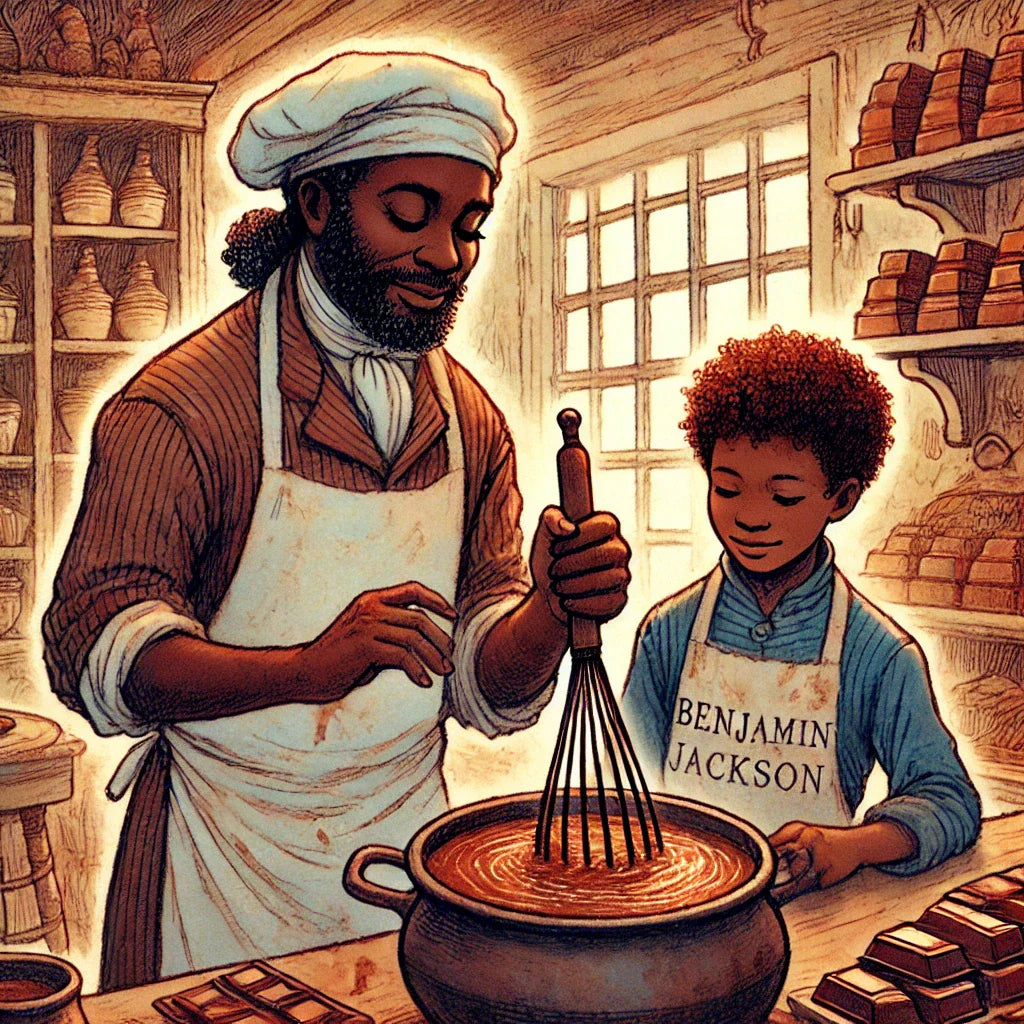
Black Chocolate History- The Legacy of Innovation
Chocolate, Black History, and the Legacy of Innovation
February 3, 2025

As Valentine’s Day nears, chocolate becomes an undeniable centerpiece of celebration—a token of affection, a sweet indulgence, a symbol of love. Yet, beyond its glossy packaging and cultural rituals lies a history far older and more complex than most realize.
It is a history that predates heart-shaped boxes, stretching back to ancient Mesoamerican civilizations, through the colonial trade routes that linked Africa, the Americas, and Europe, and into the hands of artisans whose stories have too often been overlooked. This February, a month that celebrates both Black history and the tradition of love, we at Xoxoa Chocolates look to the past to honor an early innovator: Benjamin Jackson, a Black chocolatier in 18th-century Philadelphia. His story is a testament to the resilience, craftsmanship, and entrepreneurship of Black artisans—qualities that continue to shape our work today.

Benjamin Jackson: A Revolutionary Chocolatier in 18th-Century America More than a century before chocolate became synonymous with Valentine’s Day, and long before the industrialization of confectionery, Benjamin Jackson was producing fine, stone-ground chocolate in Philadelphia. As a free Black man in colonial America, his presence in the trade was remarkable; as a successful entrepreneur in the craft, his story is extraordinary. Chocolate in Jackson’s time was not the smooth, milk-laden confection we know today. It was more robust, often consumed as a hot beverage or used in recipes that embraced its rich and bitter essence. His stone-ground method preserved the cacao’s intensity, yielding a texture and depth that modern bean-to-bar makers, including Xoxoa Chocolates, strive to revive. Operating a business in 18th-century Philadelphia—a city bustling with commerce, revolution, and the early stirrings of American identity—would have been a challenge for any entrepreneur, let alone a Black artisan navigating the barriers of racial prejudice. Yet Jackson carved out a name for himself, becoming part of the city’s thriving chocolate trade. He was not simply a craftsman; he was an early innovator, an entrepreneur, and a defier of the odds, shaping the foundation of American chocolate-making.
Chocolate, Colonialism, and the Unspoken Narratives of the Trade
Jackson’s work existed within a broader global context—one marked by both the brilliance of Black artisans and the exploitative realities of the chocolate trade. Cacao, native to Central and South America, had long been cultivated by the Indigenous peoples of the region before being extracted and commercialized by European colonial powers. By the 18th century, cacao plantations, largely in the Caribbean and West Africa, were fueled by the labor of enslaved Africans. The irony of a free Black chocolatier thriving in Philadelphia while so many others toiled in cacao and sugar fields under brutal conditions speaks to the complicated, often painful history of chocolate. This history demands acknowledgment. It also makes Jackson’s success all the more powerful—his business was a rare counter-narrative to an industry built on exploitation. Today, there are a few more black-owned chocolatiers, the likes of Ghana’s 57 Chocolates, Blondery, Philip Ashley, Jessica Spaulding and Asha Dixon of Harlem Chocolate, Sol Cacoa and of course Xoxoa- each one of us ensuring we continue to carve out space for the stories of black chocolate-makers, past, present and future. At Xoxoa Chocolates, we are deeply aware of this history and treat it as an honor to be amongst such esteemed artisans and entrepreneurs. We source our cacao with an emphasis on ethical-direct trade, sustainability, and relationships with diasporic and indigenous cocoa farming communities in African, South and Latin Americas and The Caribbean. We believe that each bean carries a message from the framers and the soil in which it was cultivated which we are entrusted to deliver in our chocolate. In doing so, we seek not only to honor the labor behind every bean but also to reframe the narrative—highlighting the beauty, resilience, and artistry within Black and Indigenous peoples' chocolate-making traditions.
Reviving a Legacy: Xoxoa Chocolates and the Future of Craft Chocolate

Much like Benjamin Jackson’s stone-ground chocolate, Xoxoa Chocolates embraces a return to the essence of cacao—bold, textured, and unapologetically rich. Our process is not just about making chocolate; it is about storytelling, about connecting past and present, about crafting a future in which Black entrepreneurs are recognized as innovators in an industry they have long shaped. While Valentine’s Day often celebrates fleeting indulgence, we invite chocolate lovers to engage more deeply—to see chocolate ask a vessel for history, heritage, and craftsmanship. This February, as we honor both Black History Month and the season of love, let us not only enjoy chocolate but reflect on its roots. Let us remember the early pioneers like Benjamin Jackson, whose legacy paved the way for modern artisans. And let us continue to support Black-owned businesses that are redefining the industry today. With each bar of Xoxoa Chocolates, we carry forward a tradition of excellence, resistance, and artistry—one that began centuries ago and will continue to shape the future of chocolate. #CelebrateBlackChocolate #BlackHistoryMonth #ValentinesDay #Xoxoabeanchocolates
